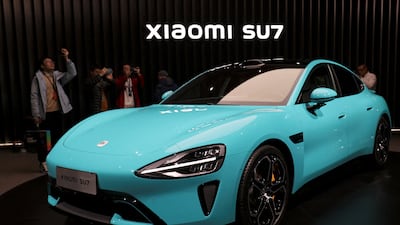Chinese electronics major Xiaomi will start deliveries of its first electric vehicle by the end of March, marking its highly-anticipated entry into a market currently experiencing a downturn.
The world's third-biggest manufacturer of smartphones will officially release the SU7 EV on March 28, its founder and chief executive Lei Jun said on Chinese social media site Weibo.
The SU7 was first announced in December, with its images revealed at the CES in Las Vegas in January before it was finally unveiled at the Mobile World Congress in Barcelona last month.
Xiaomi's entry comes amid a stall in the EV market with manufacturers trying to offer more value for money to resurrect the sector.
Last week, US EV maker Rivian Automotive unveiled the new line-up of its most affordable sport utility vehicles, aiming to challenge the dominance of Elon Musk's Tesla Motors.
Xiaomi is also keen to take on the growing number of rivals in the Chinese EV industry, led by BYD, the country's biggest, which overtook Tesla as the world's biggest EV seller in the fourth quarter of 2023.
"The most important thing is real smart technology to meet the public’s real expectations for Xiaomi and new energy vehicles," Mr Lei said in the Weibo post.
The Xiaomi SU7
The SU7 – SU meaning Speed Ultra – is Beijing-based Xiaomi's first foray into the EV market. The company said it spent more than 10 billion yuan ($1.4 billion) in the vehicle's research and development phase.
The company is positioning the EV as a "full-size high-performance eco-technology sedan" and aims to "push the limits of performance, ecosystem and mobile smart space".
The SU7 is manufactured by another Chinese industry major, car maker Baic, which also has its own EU5 EV.
Its batteries are supplied by two other important players – domestic major CATL and BYD.
Key features
Xiaomi promises that the SU7's battery has a range of up 800km – nearly double that of the Baic EU5's 450km and above the 647km of the Tesla Model S, the company's longest-range EV.
It has a maximum speed of 210kph.
The five-seater EV is also equipped with an in-house battery management system that, among others, has the highest functional safety level and an around-the-clock early warning system, Xiaomi said.
Its engine is a self-developed HyperEngine V6, which Xiaomi says will rival traditional V6 powertrains of internal combustion engines.
A traditional V6 powertrain has a power of between 172 and 485 horsepower. Xiaomi says the SU7 has a peak output of 295 HP.
Xiaomi is also developing a higher-end HyperEngine V8, whose output "sets a global record for e-motors". The company said this motor is scheduled to be mass-produced and used in Xiaomi EVs in 2025.
The SU7's autonomous driving capabilities, meanwhile, are centred on Xiaomi's own take on adaptive BEV technology, a road-mapping foundational model and super-resolution occupancy network innovation.
These three technologies will help the SU7 in different scenarios such as high-speed conditions and parking, switching driving trajectories without relying on high-definition maps, and improved obstacle recognition.
How much is the Xiaomi SU7?
Neither Xiaomi nor Mr Lei have announced the price of the SU7.
However, it is expected to be priced between 250,000 yuan (nearly $35,000) and 370,000 yuan, the South China Morning Post reported, quoting data from Shanghai-based financial news outlet Jiemian.
That compares to the made-in-Shanghai Tesla Model 3's price range of 245,900 yuan to 285,900 yuan.
The company has "made full preparations in all aspects" of its price points, Mr Lei said on Weibo.
Xiaomi is also reportedly targeting other overseas markets. But it is unclear which ones are on the radar and when the SU7 will be available in those regions.
Xiaomi, which opened its biggest Middle East store in Dubai last year, has yet to respond to The National's request for comment on the SU7's availability in the Emirates and the wider Middle East.

